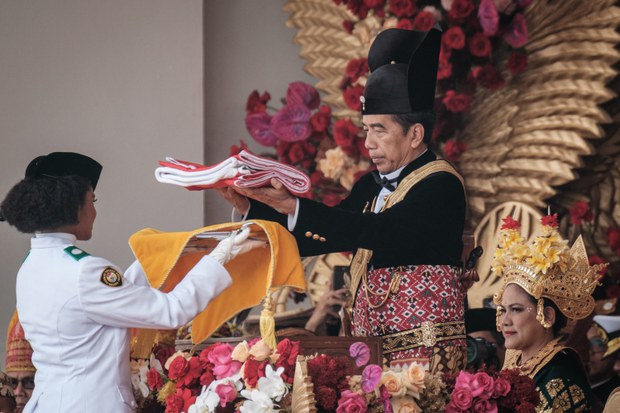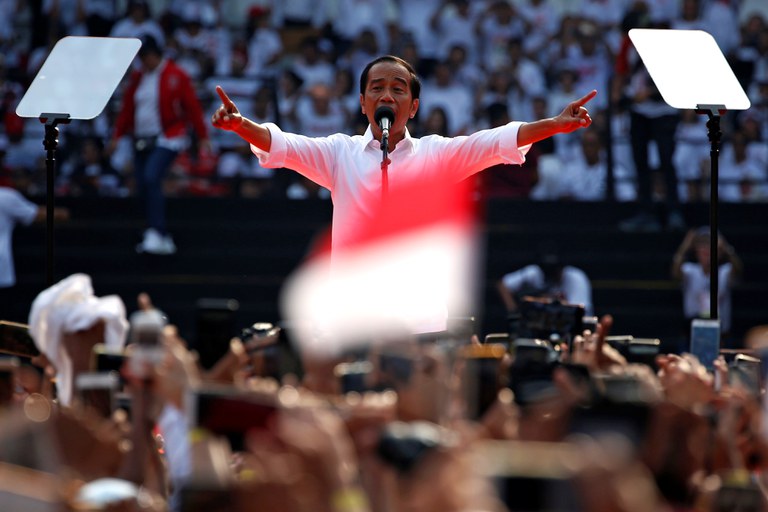Democracy activists say Indonesian president spying on political parties is ‘scandalous’
2023.09.18
Jakarta
 Indonesian President Joko “Jokowi” Widodo (right) hands over the national flag to be raised during a ceremony marking the country’s 78th Independence Day at the Presidential Palace in Jakarta, Aug. 17, 2023.
Indonesian President Joko “Jokowi” Widodo (right) hands over the national flag to be raised during a ceremony marking the country’s 78th Independence Day at the Presidential Palace in Jakarta, Aug. 17, 2023.
Human rights and democracy activists on Monday denounced President Joko “Jokowi” Widodo for potential abuse of power after he bragged that he had access to intelligence agencies’ information on political parties and their election strategies.
The constitution says the purpose of collecting intelligence is to detect threats to national security, activists said, adding political parties should not be monitored because they are not a risk to the country’s security.
“The purpose of intelligence information is to protect the nation from its enemies and threats, not to interfere with the political affairs and activities of civil society and parties,” said Julius Ibrani, a representative of the Civil Society Coalition for Security Sector Reform, a group of NGOs.
“We consider this a political scandal and a serious problem in democracy that must be investigated thoroughly. The parliament should summon the president and related intelligence agencies for an explanation,” Julius told BenarNews.
On Saturday, Mohammad Mahfud MD, the coordinating minister for political, legal and security affairs, told CNN Indonesia it was normal for Jokowi to have intelligence information about the political situation, noting it did not mean he would use the information for political interests.
Jokowi revealed on Saturday that he had data, information on survey results and the direction of political party support from the State Intelligence Agency, the police intelligence unit and the Strategic Intelligence Agency of the Indonesian military.
“I know the ins and outs of the political parties. I also know the direction they are headed,” Jokowi said at a Bogor event for a volunteer group that supported him in the 2019 presidential election.
“I have intelligence from BIN [the State Intelligence Agency]. I have intelligence from the National Police. I have intelligence from the TNI [military], and other information,” he said.
Jokowi’s revelation came while he was urging his supporters to vote for the right candidate in the Feb. 14, 2024, presidential election.
He said the election was critical because the next leader would determine whether Indonesia could become a developed country.
Officials at the State Intelligence Agency could not be reached for comment.
Julius, of the coalition of NGOs, said the collection of data and information by intelligence can be used only for policy making purposes, not misused to spy on political actors for Jokowi’s personal political interests.
“Intelligence agencies provide information to the president, but it should be related to state security – and in a democratic country, political parties are not a national security threat,” he said.

Activists had suspected that the government spied on political opponents after devices of dozens of senior government and military officials were allegedly targeted by Israeli spyware “Pegasus,” Julius said.
In June IndonesiaLeaks, a consortium of media outlets and investigative journalists, reported that Indonesia’s State Intelligence Agency and police may have used Pegasus to spy on politicians and activists.
Among the targets were former opposition leader Prabowo Subianto, now defense minister, and Airlangga Hartarto, the economy minister and chairman of the Golkar Party, the whistle blower service said.
Pegasus is spyware developed by the Israeli cyber-arms company NSO Group that is designed to be covertly and remotely installed on mobile phones running iOS and Android.
While the NSO Group markets Pegasus as a product for fighting crime and terrorism, governments around the world have routinely used the spyware to surveil journalists, lawyers, political dissidents and human rights activists, reports have said.
Jakarta supports Palestinian statehood and does not recognize Israel, but the devices to hack into phones and install the software did not come into the country directly from the Jewish state, according to IndonesiaLeaks.
‘Abusing the president’s authority’
Mahfud MD, the chief security minister, said the president needed to have intelligence information about political actors in the country, both the good and the bad ones.
“Who has shady work, who has clean work, that’s what the president knows,” he was quoted as saying by CNN Indonesia.
“What’s the use of intelligence agencies if they don’t report to the president?”
Surya Tjandra, a spokesman for opposition presidential hopeful Anies Baswedan, said any intelligence information should not be used for personal interests and must be obtained legally.
“The important thing is that the information should not be for the personal interest of the president, and fully used to help make policies and maintain democracy,” he told BenarNews.
Intelligence data was not public information, said Feri Amsari, a constitutional law analyst at Andalas University in Padang.
“If Jokowi uses it to monitor parties, it means he is abusing the president’s authority for short-term political interests,” Feri told BenarNews.
“It is [an] abuse of power,” because the president cannot use state tools, in this case BIN, to spy on parties, Feri said.
Human rights groups and analysts have said Indonesia has seen democratic backsliding under Jokowi’s leadership. They cite rampant restrictions on civil liberties and police surveillance.
In an October 2022 report, rights NGO KontraS said the climate of freedom had worsened in the three years of Jokowi’s second term, pointing to cases of arbitrary arrests and attacks on government dissidents.
In a separate development on Sunday, the Democratic Party announced its support for Prabowo as presidential candidate for the 2024 election, joining a coalition of parties led by the former general who lost narrowly to Jokowi in 2014 and 2019.
The 2024 presidential election is expected to be a race among Prabowo and two other contenders: Ganjar Pranowo, the former governor of Central Java and the candidate of Jokowi’s Indonesian Democratic Party of Struggle; and former Jakarta Gov. Anies Baswedan.







